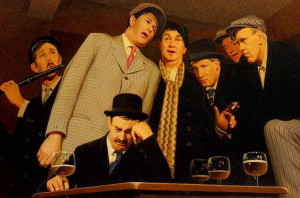FIFTH DAY of CHRISTMAS
Bring in the Boar
Soon after I began making letterpress printed limited edition books in 1994, I named my press Red Wagon Press (after the Jane Siberry song “The Life is the Red Wagon”) and that was good, but it turned out there were other Red Wagon Presses out there. All of them were making things I didn’t want you thinking I had made, and by the early oughts Seth and I were on the lookout for a new press name. We tried a few on for size (you could very well have been reading the Factory Bookworks Book of Days), but ultimately it was Convivio Bookworks that won out and that we have kept with these 17 years now. It seemed a good fit in 2003, and still does now, for the name suggests celebration and festivity and an honoring of heritage: all things that we have come to love and try to honor in our work and in our small Lake Worth home.
The Convivio name comes directly from an ancient Christmas carol called “The Boar’s Head Carol”. Do you know it? It is a Macaronic carol, meaning it contains both Latin and another language, in this case English.
The Boar’s head in hand bear I
Bedecked with bays and rosemary
And I pray you, my masters, be merry
Quot estis in convivio! [So many as are at the feast!]
The Boar’s head, as I understand,
Is the rarest dish in all the land
When thus bedecked with a gay garland
Let us servire cantico! [Serve with a song!]
Caput apri defero,
Reddens laudes Domino! [The Boar’s head I bring, giving praises to God!]
Our steward hath provided this
In honor of the King of bliss,
Which on this day to be served is.
In Reginensi atrio! [In the Queen’s Hall!]
Caput apri defero,
Reddens laudes Domino!
It is a carol connected directly to Queen’s College, Oxford. As the story goes, a young student of the university many centuries ago was out in the surrounding woods when he was charged by a wild boar. The student saved himself with the only weapon he had upon him: a dusty old volume of Aristotle, which he shoved down the throat of the charging beast and so brains, in this case, won out over braun. The victorious student then brought the boar’s head back to the college and had it for dinner, to much fanfare… and so the tradition goes. The tradition persists despite wild boar being virtually extinct from Britain since at least the 12th century (long before the story takes place).
Aside from the Queen’s College story and our old Boar’s Head Carol, there are other associations between the boar and these darkest nights of midwinter. To the Celts, the boar was sacred, a gift from the Otherworld, ferocious, feared, respected, and the provider of the great feasts of midwinter. And in the Scandinavian countries, Frey, the sun god, rode across the sky on a boar with golden bristles that shone like rays of the sun.
And so on this day, we are to bring in a great feast: the theme of Yuletide through the ages. Back in more celebratory times, folks would not work at all through the Twelve Days of Christmas. Nowadays, however, most of us return to work soon after Christmas Day. My recommendation? Whatever feast you can conjure for tonight is a good one. It need not be elaborate. But whatever you’re serving, do it with fanfare and celebration and you will be honoring the spirit of this Fifth Day of Christmas. (Here’s a delightfully nerdy suggestion: sing “The Boar’s Head Carol” as you bring your supper to table, but change out the words to reflect what’s on the menu. I’ve done this before with special meals (The crown roast in hand bare I / Bedecked with bays and rosemary), but it works with all sorts of menu items (The mac and cheese in hand bare I / Bedecked with bays and rosemary). It’s Christmastime; go on, be festive.)
Here’s something else you might enjoy: One of our readers, Melissa Wibom in Sunnyvale, California, sent me a few years back a link to a BBC Radio 4 program about Christmas carols. Seth and I listened then, and in the process got hooked. It’s extremely entertaining and informative, but alas, no longer available on the BBC website. So last year, we got the 2 CD set of the full series. Seth and I are not a “Here Comes Santa Claus” or “Rudolph the Red Nosed Reindeer” kind of people. Songs like that are all well and good, but they’re not very complex and they don’t have staying power through a full Yuletide season. When we speak about Christmas lasting Twelve Days in this house, our house is filled with the kind of music you’ll hear in this program, which is now available as an audiobook, too. It’s called A Cause for Caroling; it is researched, written, and read by Jeremy Summerly, with lots of great music throughout. You will hear old old carols you may never have heard before, or carols that have some resonance of memory for you, songs you know in your bones and heart if not in your ear.
So go, feast and be merry. Listen and enjoy. You, too, will shout with the likes of Seth and me and all those through the ages hailing this dark and mysterious midwinter time: “Welcome, Yule!”
Image: “Sentimental Ballad” by Grant Wood, 1940, oil on masonite, 24 x 50 inches, New Britain Museum of American Art. [Public domain] via Wikimedia Commons. As the image may suggest, there’s always someone who doesn’t like Christmas carols. We, however, do. The image also follows something you’ll learn listening to the BBC program: Christmas carols are, by and large, things that came out of pubs, not churches… which may explain why Christmas was banned in Puritan England. Music of the people, earthbound hymns. Cheers!
